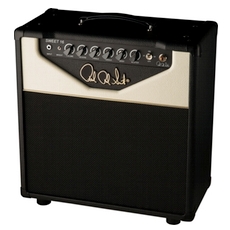 Despite the amp’s expensive price tag (particularly for a single channel amplifier), the PRS Sweet 16 is worth the price of admission.
Despite the amp’s expensive price tag (particularly for a single channel amplifier), the PRS Sweet 16 is worth the price of admission.
Since the mid 1980s, Paul Reed Smith has earned a coveted reputation as a master guitar builder, having designed countless quality guitars, including such well-respected models as the Custom 22, Custom 24, McCarty, and Singlecut.
Before the release of the PRS amplifier line in 2008, though, not too many people knew that PRS is pretty knowledgeable about guitar amps as well. The PRS partnership with legendary amp designer Doug Sewell has yielded some first class amplifiers in recent years, including such highly praised amps as the Dallas and Blue Sierra.
Of course, these premium amps come with a hefty price tag. Enter the PRS Sweet 16, which sports the same quality tone and performance as its bigger brothers, but at a much more affordable price (and reduced output). For many players, though, the smaller footprint and reduced wattage of the Sweet 16 might even be more appealing. Let’s look at the details and see how sweet this amp really is.
Specifications
The PRS Sweet 16 is a single-channel amp that makes up in tone what it lacks in features. It sports EQ controls for treble, middle, and bass, as well as volume and master volume. A bright switch is standard, as is a short-pan reverb. One interesting feature of the master volume control is that, when cranked, it is completely removed from the circuit path, so the amp becomes a non-master volume amplifier.
A single power switch provides standby duties (off/standby/on). The amp’s simplicity is also echoed on the back panel, which has a simple speaker output jack, extension speaker out, and impedance switch. In keeping with the amp’s simple design, no effects loop is to be found.
The Sweet 16 is powered by a pair of 6V6 power tubes which are cathode-biased (resulting in improved harmonics, compression, and response). The preamp and reverb section are powered by 12AX7 and 12AT7 tubes. The combo (which I tested) features a Celestian G12H Vintage 30 12” speaker.
Performance
It’s hard to describe the Sweet 16 as being a “Fender,” “Vox,” or “Marshall” style amplifier. Honestly, you can find most classic amp tones in here if you look hard enough. It’s easy to get the clean chimes of a Vox AC30, but the EQ and reverb also make it equally effortless to dial in sounds reminiscent of a Fender Deluxe Reverb. However, given the amp’s unique volume knob circuitry, it’s also pretty easy to get Marshall Plexi tones as well (in a much more manageable package, of course).
While the variety of sounds is pretty amazing (especially given the amp’s apparent simplicity), the real “mojo” happens when you see how sensitive the amp is to a player’s touch. The dynamics of this amplifier are impossible to quantify. When plugged in, it’s almost like you’re playing a single instrument, not two separate entities. Few amplifiers allow you to control your sound simply using your guitar’s volume knob as easily as the PRS Sweet 16. The amp responds to every nuance, from a light touch to country pops.
Given the amp’s relatively light weight, I opted for the combo, which is a semi-open back design. This was also a stylistic choice. I’m primarily a blues, jazz, and classic rock player, so the looser feel of the semi-open combo fits my needs perfectly. I’ve tried the head/cabinet version as well, and as you’d expect it’s a bit tighter and punchier. Still, it’s impossible to get a bad sound out of either.
Final Thoughts
Despite the amp’s expensive price tag (particularly for a single channel amplifier), the PRS Sweet 16 is worth the price of admission. Don’t be fooled by this amplifier’s simple layout, which masks an array of complex sounds. Unless you’re a diehard metal fan, you can get what you want, since the amp contains a virtual warehouse of tones in the jazz, country, blues, and class rock genres.
Name of Gear: PRS Sweet 16 Combo
List Price: $2,045
Manufacturer Info: PRS Guitars, prsguitars.com
Pros: Versatile; responsive; lush reverb
Cons: A bit pricey for a single channel amplifier